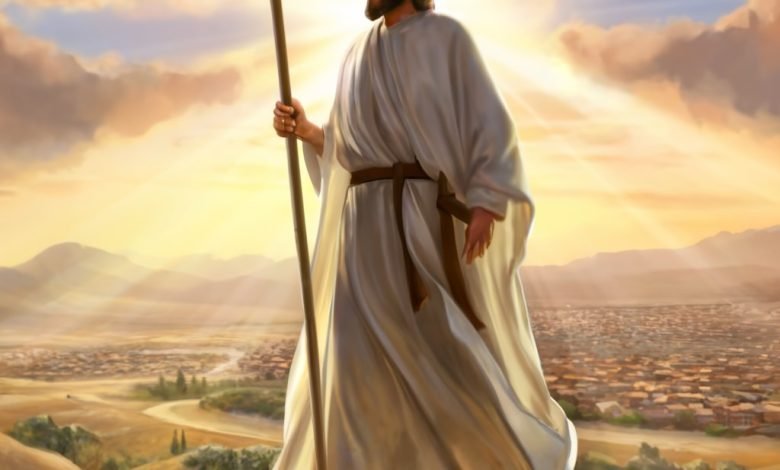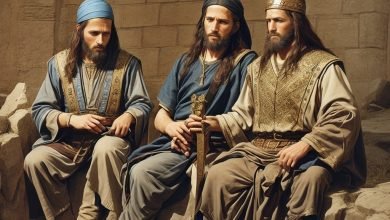
What was the story of Abraham in the Bible?
What was the story of Abraham in the Bible?: What role does Abraham play in the Bible? There is much to learn about Abraham from the Bible, but some of his actions can be difficult to understand. Are there hidden insights in this story that we have missed?
Abraham, known as the “father of many nations,” stands as one of the most prominent examples of faith and obedience. His life calls all of humanity to the blessing of salvation through Jesus Christ, who would later come from his lineage. This is a story of redemption through faith and the practice of faith through obedience. Ultimately, this story turns our eyes toward the God of Abraham, whose faithfulness to the divine covenant never changes.
Abraham is one of the two people in the Bible who is called a “friend of God” (James 2:23). It is clear that God holds a special place in His heart for this man, and we can learn much from his life. From great victories to notable shortcomings, Abraham is portrayed as a flawed man with unwavering faith in God and His promises, guiding us to recognize him as the father or leader of our faith.

فرست محتوا
When do we first meet Abraham in the Bible? (Abraham in the Bible)
In the eleventh chapter of Genesis, we first encounter Abraham, who was then called Abram, as the son of Terah. He grew up in the city of Ur of the Chaldeans, in ancient idolatrous eastern Mesopotamia, present-day Iraq, where the moon god Sin was worshipped. In Genesis 11:31, we are told that Terah took his son Abram, his wife Sarai, and his nephew Lot and set out from the dark and godless city of Ur toward Canaan. However, instead of completing the journey, they settled in Haran, now known as southern Turkey.
The Bible does not provide many details about why Terah decided to leave Ur of the Chaldeans with his family. Interestingly, we know that they were moving toward Canaan, the land later promised to Abraham’s descendants, the Israelites. Did Terah have an inkling that God would call his son to inherit this land?
Joshua 24:2 identifies Terah as someone who worshipped other gods, so it does not seem that he left the city out of obedience or direct guidance from God. We may never know why his family left, but even with Abraham growing up in an idolatrous land, we can see God’s mighty hand and sovereignty over his life.
This provides a clear picture of God, our Shepherd, who guides us according to His will, even before we are aware of it. Among all the people on earth, God had already chosen Abraham to call him into a covenant with Himself. Leaving Ur was just the beginning of the journey of faith that God had called him to.
In our first encounter with Abraham in the Bible, we see exemplary faith, trust, and swift obedience. In Genesis 12:1, God calls Abraham to leave Haran and says, “Go from your country and your kindred and your father’s house to the land that I will show you” (ESV).
Just three verses later, we read that “Abram went, as the LORD had told him” (Genesis 12:4). Simply put, he went.
Of course, we do not know everything that happened between these verses. We can only imagine the questions, emotions, and doubts he grappled with (like anyone who receives a similar, ambiguous call from God). Nevertheless, he obeyed despite the possible consequences.
Hebrews 11, known as the “Hall of Faith,” describes it this way:
“By faith Abraham obeyed when he was called to go out to a place that he was to receive as an inheritance. And he went out, not knowing where he was going. By faith, he went to live in the land of promise, as in a foreign land, living in tents with Isaac and Jacob, heirs with him of the same promise. For he was looking forward to the city that has foundations, whose designer and builder is God” (Hebrews 11:8-10).
Abraham, with an eternal perspective, knew he was a “stranger and exile on the earth” (Hebrews 11:13). He awaited a city that God was building for him, even if he never saw the fulfillment of the promise in his lifetime. Such faith paves the way for future generations—a sacrificial and courageous faith rooted in the revelation of God Himself as the reward (Genesis 15:1).
Abraham’s Barrenness (Abraham in the Bible)
Why was Abraham and Sarah’s barrenness considered a tragedy? God promised Abraham a great nation and later reaffirmed His promise by comparing Abraham’s descendants to the stars in the sky. However, years passed, and Abraham and Sarah, growing older each day, remained childless.
We know that during the years of waiting, Abraham and Sarah had moments where they questioned their faith in God and even attempted to manage the situation themselves. However, the Bible clearly states that Abraham, despite the seeming impossibility of their circumstances, kept his heart focused on trusting and maintaining faith in God.
“He did not weaken in faith when he considered his own body, which was as good as dead (since he was about a hundred years old), or when he considered the barrenness of Sarah’s womb. No distrust made him waver concerning the promise of God, but he grew strong in his faith as he gave glory to God, fully convinced that God was able to do what he had promised” (Romans 4:19-21).
However, this does not mean the wait was easy. Learning about the culture in which Abraham and Sarah grew up provides a deeper understanding of why their barrenness was considered a tragedy. Barrenness brings pain and suffering regardless of cultural background, but in ancient Middle Eastern culture, a barren woman was likely judged by the gods and culturally shamed for not fulfilling her expected social role.
Furthermore, since the primary purpose of marriage in ancient Middle Eastern culture was procreation and continuation of the father’s lineage, a man could take additional wives (or concubines) or divorce his “first-rank” wife if she did not bear children. Sarah unjustly succumbed to this tradition when she convinced Abraham to start a family with Hagar, their Egyptian maidservant. This led to the birth of Ishmael and a lasting enmity between him and Isaac, the promised son (Genesis 16:12).
Thus, Abraham and Sarah’s barrenness carried a heavier burden. Their faith in God’s promise was severely tested, and they also bore the shame and humiliation surrounding their inability to continue the family line.
Finally, when Abraham was 100 years old and Sarah was 90, Isaac, the promised son, was born. The Lord demonstrated His power, purpose, and plan through Sarah’s barren womb and the eventual miraculous fulfillment of His promise.

Why did Abraham agree to sacrifice his son? (Abraham in the Bible)
In Genesis 22, God tested Abraham by asking him to sacrifice Isaac, his son, as a burnt offering. Abraham promptly obeyed God’s voice once again, setting out early in the morning to the place God had instructed, Mount Moriah (now known as the Temple Mount).
Upon arrival, Abraham told his servants, “Stay here with the donkey; I and the boy will go over there and worship and come again to you” (Genesis 22:5). Abraham was confident that Isaac would return with him and even assured his son that “God will provide for himself the lamb for a burnt offering” (Genesis 22:8).
Hebrews 11:17-18 explains: “By faith Abraham, when he was tested, offered up Isaac, and he who had received the promises was in the act of offering up his only son, of whom it was said, ‘Through Isaac shall your offspring be named.’ He considered that God was able even to raise him from the dead, from which, figuratively speaking, he did receive him back.”
Abraham’s faith in God surpassed his human understanding. He knew, because God had said, that Isaac would live. God had promised him that he would have descendants (indeed, a great nation) through Isaac. With absolute trust in God’s word, Abraham obeyed, knowing that God would uphold His covenant regardless—even if it meant raising Isaac from the dead.
As Abraham prepared to obediently sacrifice his son, an angel of the Lord called out from heaven and declared, “Do not lay your hand on the boy or do anything to him, for now I know that you fear God, seeing you have not withheld your son, your only son, from me” (Genesis 22:12).
Abraham’s example shows that walking in the fear of the Lord requires obedience, as obedience demonstrates our reverence and submission to God, whose ways are higher and greater than our own.
What covenant does God make with Abraham in the Bible?
In the Bible, when God made a covenant with Abraham (see Genesis 12:2-3), He swore by Himself, “since he had no one greater by whom to swear” (Hebrews 6:13). Therefore, this promise depended not on Abraham but on the unchanging nature and word of God.
Later, in Genesis 17:1-2, God appeared to him and said, “I am God Almighty; walk before me, and be blameless, that I may make my covenant between me and you, and may multiply you greatly” (ESV).
Following this, God established circumcision as the sign of the covenant. Any uncircumcised male who did not keep the covenant was to be cut off from his people (Genesis 17:14). The word “keep” in this context (Genesis 17:9) means to guard or protect. While God had already made an unconditional covenant, Abraham and his descendants were called to guard and protect this covenant.
The threefold Abrahamic covenant includes:
- The promise of land: “To your offspring, I will give this land” (Genesis 12:7, ESV).
- The promise of descendants: “I will make of you a great nation” (Genesis 12:2, ESV).
- The promise of blessing and redemption: “In you, all the families of the earth shall be blessed” (Genesis 12:3, ESV).
This covenant has eternal significance. In Galatians 3:29, Paul writes, “If you are Christ’s, then you are Abraham’s offspring, heirs according to promise.” Thus, those who are in Christ are heirs of Abraham and partake in the blessings and promises God made to him.
What can we learn from the life of Abraham in the Bible?
- Faith and obedience go hand in hand: From Abraham’s first call to leave Haran to his readiness to sacrifice Isaac, we see a man who responded to God’s commands with unwavering obedience and faith.
- God’s promises are true and reliable: Despite delays and apparent impossibilities, Abraham trusted God’s promises, knowing that He is faithful and will fulfill His word.
- God can use anyone: Abraham was not a perfect man. His journey had moments of doubt and failure. Yet God chose and used him to establish a covenant that would ultimately lead to the salvation of all humanity through Jesus Christ.





